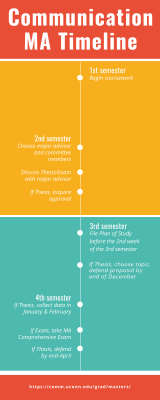All students must complete a program of study of at least 33 credit hours of graduate course work, including a core of required courses. Students must culminate their MA program by either writing a thesis or taking a comprehensive exam. The department encourages all students to discuss their options with their committee members, though most MA students choose the exam option. It is possible for students to complete a project and oral exam rather than the traditional written and oral exam. This approach is sometimes desirable for people going into applied areas. Past projects have been done by students studying new communication technology and communication campaigns.
The MA program provides the student with a strong theoretical base for analyzing and researching human communication. Students will receive excellent preparation for PhD work, as well as a wide range of information about communication that may be applied in many non-academic settings. Students may wish to focus their studies in more applied domains and use their knowledge of communication theory and research methods in a commercial setting. For example, students who specialize in marketing may find employment in marketing research firms, larger advertising agencies that maintain their own research departments, and corporations that produce and evaluate their own advertising or personal sales materials. Students interested in careers as behavioral researchers and change agents in organizations may wish to specialize in strategic or organizational communication. Such specialties may include a variety of theoretical approaches to organizational behavior and organizational change techniques through coursework in other departments.
Core Courses
Core courses provide the student with exposure to the major research techniques central to the scholarly literature of communication. The basics of theory construction, techniques of data gathering and data analysis, and typical research projects in communication are covered. As a group, these courses provide a basis for advanced coursework offered by the department.
Core courses and the semester in which each should be completed are listed below:
COMM 5000 Fundamentals of Theory, Research, and Design (1st sem)
COMM 5001 Introduction to Graduate Communication Research (1st sem)
COMM 5002 Communication Research Methods (2nd sem)
The remainder of the student’s program will be determined in consultation with the student’s advisor and Advisory Committee. Students may include courses from other departments within the University with the permission of the Advisory Committee.
Choosing a Specialty
In addition to the Core Courses listed above, students must take two core theory courses relevant to their specialty area, as determined by the major advisor and committee members. Such courses might include:
COMM 5100 Persuasion Theory and Research
COMM 5200 Interpersonal Communication
COMM 5230 Organizational Communication: Theory and Research
COMM 5300 Mass Communication Theory
COMM 5660 Computer-Mediated Communication
COMM 6850 Seminar in Marketing Communication
To complete the course requirements, students must choose additional courses from COMM offerings (four additional courses for thesis option; six additional courses for comprehensive exam option) and one related elective course inside or outside the department (for a total of 33 course credits). For students with a specialty area in a related discipline, up to three of the six courses (for the exam option) and up to two courses (for the thesis option) may be outside of the department. Additional courses inside and outside the department might include (in addition to the courses noted above):
COMM 5101 Motivation
COMM 5120 Communication Campaigns
COMM 5150 Crisis and Risk Communication
COMM 5220 Group Communication Research
COMM 5310 Seminar in Mass Communication Research
COMM 5330 Children and Mass Media
COMM 5500 Nonverbal Communication
COMM 5501 Nonverbal Communication & Persuasion
COMM 5640 Social Media Use and Effects
COMM 5650 Communication Technology and Society: Theory and Research
COMM 5900 Professional Communication
MKTG 5115 Market-Driven Management
MKTG 5220 Strategic Marketing
MKTG 5625 Marketing for Global Competitiveness
MKTG 5230 Product and Innovation Management
MKTG 5635 Marketing for Non-profit Institutions
MKTG 5640 Integrated Marketing Communications
MKTG 5660 Customer and Market Behavior
OPIM 5110 Operations Management
PSYC 5613 Industrial Psychology
PSYC 5703 Advanced Social Psychology
These are simply examples of potential course options. Other courses may be substituted by Advisory Committee approval.